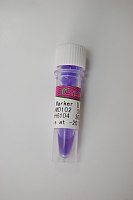Quantitative Analysis of Somatic Mitochondrial DNA Mutations by Single-Cell Single-Molecule PCR
互联网
533
Mitochondrial genome integrity is an important issue in somatic mitochondrial genetics. Development of quantitative methods is indispensable to somatic mitochondrial genetics as quantitative studies are required to characterize heteroplasmy and mutation processes, as well as their effects on phenotypic developments. Quantitative studies include the identification and measurement of the load of pathogenic and non-pathogenic clonal mutations, screening mitochondrial genomes for mutations in order to determine the mutation spectra and characterize an ongoing mutation process. Single-molecule PCR (smPCR) has been shown to be an effective method that can be applied to all areas of quantitative studies. It has distinct advantages over conventional vector-based cloning techniques avoiding the well-known PCR-related artifacts such as the introduction of artificial mutations, preferential allelic amplifications, and “jumping” PCR. smPCR is a straightforward and robust method, which can be effectively used for molecule-by-molecule mutational analysis, even when mitochondrial whole genome (mtWG) analysis is involved. This chapter describes the key features of the smPCR method and provides three examples of its applications in single-cell analysis: di-plex smPCR for deletion quantification, smPCR cloning for clonal point mutation quantification, and smPCR cloning for whole genome sequencing (mtWGS).









